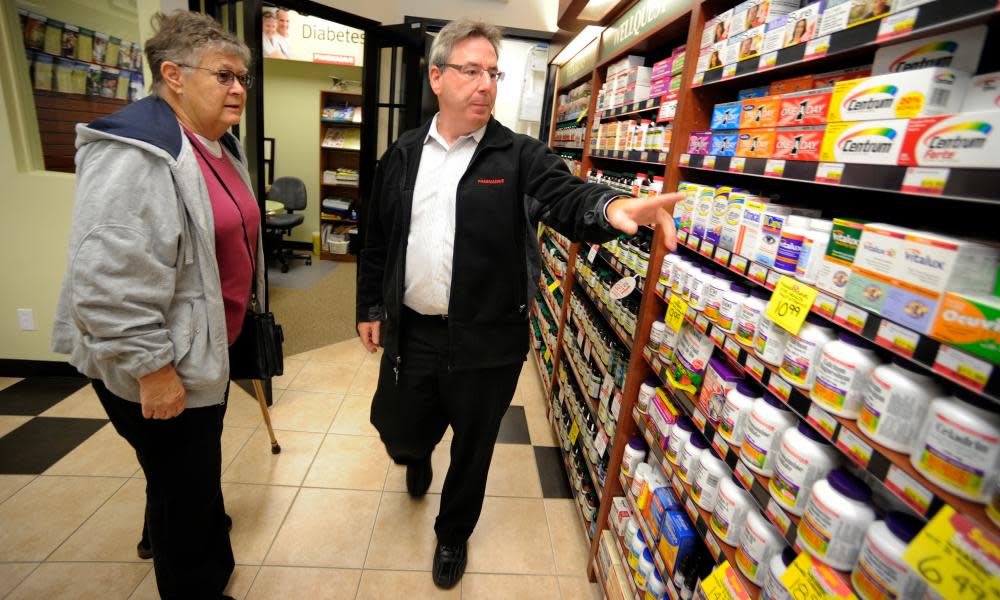Canada faces battle for pharmacare scheme to make medicines free

In his campaign for universal publicly funded healthcare in the US, Bernie Sanders has repeatedly held up Canada’s system as an example, highlighting the pride Canadians take in the idea that medical care is a right for everyone.
But his legislation would aim to go further, addressing a critical shortcoming: that Canada is the only developed country in the world with a universal healthcare system that does not cover essential medications.
“It’s a big issue, a big problem,” Danielle Martin, a Toronto doctor, told Sanders in a recent podcast. “I have patients who take their pills every other day, or who take them for a few weeks and then have to wait until the cheque comes in to fill it again.”
The gap, said Martin, was partly because Canada’s system was designed in the 1960s, when prescription medication was less of a focus for care. Today Canadians, however, face the second-highest drug costs in the industrialised world, after Americans. And they are forced to cover those costs either out of their own pockets, or through a patchwork of provincial and private drug plans.
The result has left many in Canada choosing between meeting their basic needs or complying with the doctors’ orders, said Hassan Yussuff of the Canadian Labour Congress. “If you’re not fortunate enough to work for a sizeable employer that has the resources to provide you with benefits, you’re left on your own,” he said.
His organisation, which represents labour unions across Canada, recently launched a campaign for a national pharmacare plan. “This patchwork that we have throughout the country is devastating for working Canadians,” he said. “We believe anyone with healthcare should have coverage for the medication they need.”
About 700,000 Canadians – many of them in precarious or lower-paid jobs – have no prescription drug coverage at all, while another 3.6 million are believed to have coverage that falls short of allowing them to afford medications, according to estimates from the government.
“What we do know is that far too many Canadians are going without medication,” said Yussuff. “Studies have indicated they’re splitting their medication, they’re sharing their medication and in some cases not taking it.”
This month, the country’s New Democratic party (NDP) introduced a motion to force the federal government to begin laying the groundwork for a universal pharmacare program. “Here is the absurdity,” the NDP MP Don Davies told the House of Commons as he put forward the legislation. “If someone cuts a finger, he or she goes to the doctor who stitches it up, and the individual leaves and never sees a bill. However, if people go to a doctor and their ailment needs to be treated by medication, they are at the mercy of their ability to pay.”
While the legislation has little chance of passing without support from Justin Trudeau’s Liberal party, which holds a majority in parliament, the NDP motion got a recent boost from the country’s parliamentary budget officer.
The independent government agency estimated that a national pharmacare program – under which one entity would negotiate bulk purchases of pharmaceuticals for all Canadians – could slash the overall cost of prescriptions in the country by more than C$4bn a year.
But more than C$19bn in net costs to run the program would probably fall on the federal government.
Supporters of the proposal say that the system already shoulders a high price for patients who can’t afford to take their medications. Davies gave the example of a diabetic patient who ended up in intensive care after being unable to pay for insulin. The single hospital visit, he said, “costs more money than providing free medication for life”.
Recent research suggests that a national pharmacare scheme could save Canadians as much as C$11bn a year, said Steve Morgan, a professor at the University of British Columbia. “My research group’s best available estimate to date is in the ballpark of about $7bn a year in savings.”
The idea has begun to gain traction, with one poll suggesting that as many as 91% of Canadians are in support. “I think it has to do with the extent that Canadian medicare is a source of pride for Canadians,” said Morgan. “Particularly at this point in history, this idea that only the United States does what Canada does on pharmaceuticals is probably a source of embarrassment.”
The federal government is not currently considering adopting the program, however, but a spokesperson for the country’s health department, Health Canada, said the government had budgeted C$140m over five years to lower drug prices and improve Canadians’ access to prescription drugs.
“By working collaboratively with provinces, territories and other partners, we will lower drug prices, provide timely access to new medicines if they are effective, and improve patient care through more appropriate prescribing.”
The government’s stance echoes what the Canadian Labour Congress heard earlier this year when it lobbied for universal pharmacare.
Many of them liked the idea but balked at the cost, said Yussuff.
His organisation is digging in its heels, readying for what is likely to be years of campaigning. “We know a little bit about taking on big national issues – it’s been part of our history over the years,” said Yussuff, whose organisation spent nearly nine years campaigning – successfully – to expand Canada’s pension plan.
He described this campaign in the same vein – a hard-fought battle seeking to address an inequality that has become normalised in Canada. “Nobody should have to choose between paying for groceries or the medication they need,” he said. “Those choices should not be happening in a modern country as ours.”

 Yahoo News
Yahoo News 
